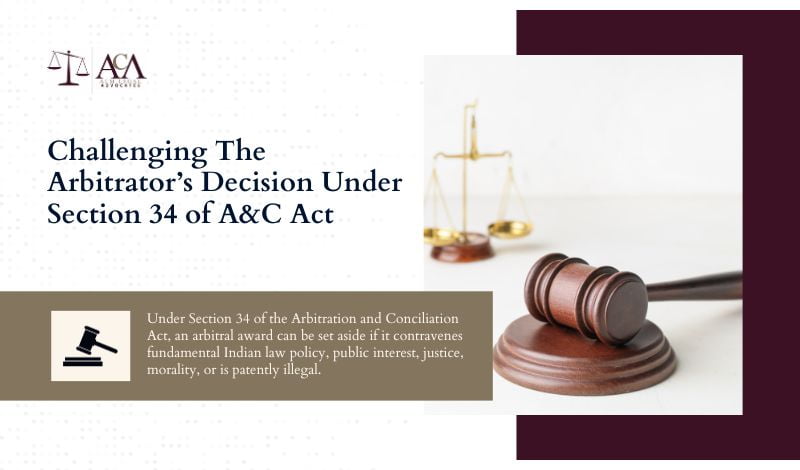Table of Contents
Toggle
Preserving Equity: Challenging The Arbitrator’s Decision Under Section 34 of A&C Act
The Supreme Court has observed that on certain occasions, decisions are made with equity as a guiding principle, and such determinations should not be invalidated under Section 34 of the Arbitration and Conciliation Act, 1996 (A&C Act), solely on the basis of perceiving the arbitrator’s approach as arbitrary or capricious. In a civil appeal presented by Batliboi Environmental Engineers Limited (BEEL), contesting the judgment of the Bombay High Court, which had allowed the appeal filed by Hindustan Petroleum Corporation Limited (HPCL) under Section 37 of the A&C Act, thereby annulling the Arbitral Award, the Court offered its verdict. The Bench articulated that an award is deemed contrary to principles of justice when it profoundly offends the sensibilities of the court. An illustrative instance of this would be a scenario in which the claimant has constrained their claim, yet the Arbitral Tribunal has issued an award for a higher amount without any discernible reasonable justification.
BACKGROUND
HPCL entered into a turnkey contract with BEEL for the design, supply, erection, testing, and commissioning of a 23 MLD capacity Sewage Water Reclamation Plant in the Mahul Refinery area, with a contract value of Rs. 574.35 Lakhs, to be completed within 18 months. Due to various project delays, BEEL abandoned the work, and as of March 30, 1996, only 80 percent of the work was finished. Subsequently, arbitration proceedings were initiated to address the dispute. The 2 arbitral awards rejected HPCL’s claims for liquidated damages, citing that the delay resulted from HPCL’s omissions and commissions. Consequently, HPCL filed an appeal with the High Court, which ruled in favour of HPCL, setting aside the Arbitral Award. BEEL filed an appeal before the Supreme Court against the High Court’s decision.
ANALYSIS
The Scope and Extent of the Court’s Authority under Section 34 of the Act:
The Court emphasized that the cornerstone of arbitration lies in party autonomy. However, it cautioned against treating party autonomy as an absolute defence that can override the constitutional and fundamental human right to a fair and just resolution of disputes, even when parties have willingly agreed to refer their disputes or claims to a private tribunal. The Court further elucidated that the courts should exercise their powers under Section 34 of the Act when an Arbitral Award is manifestly unfair, arbitrary, perverse, or legally flawed.
In broadening the interpretation of the term ‘public policy’ as delineated in Section 34 of the Act, the Court drew from the precedent set in ONGC Ltd. v. Saw Pipes Ltd., (2003) 5 SCC 705, wherein it was established that ‘public policy’ encompasses matters concerning the public good and public interest. Consequently, the Court expanded the scope of the court’s jurisdiction under Section 34 of the Act, affirming that an award may be set aside if it contravenes:(a) the fundamental policy of Indian law(b) the interests of India(c) principles of justice or morality(d) if it is patently illegal.Furthermore, the Court referenced McDermott International Inc. v. Burn Standard Co. Ltd., (2006) 11 SCC 181, which elaborated on ‘patent illegality’ as an additional ground introduced in ONGC Ltd. v. Saw Pipes Ltd., (2003) 5 SCC 705. It clarified that ‘patent illegality’ must be of such gravity that it strikes at the core of the matter, and a violation of public policy should be so unjust and unreasonable as to 3 deeply disturb the conscience of the Court, indicating that the arbitrator acted in contravention of the express law of the contract or granted relief beyond the scope of the law.Moreover, the Court drew from Associate Builders v. DDA, (2015) 3 SCC 49, in which it delved into the concept of the ‘fundamental policy of Indian law’ under Section 34 of the Act. The Court emphasized that a decision must adhere to principles of fairness, reasonableness, and objectivity, rejecting anything arbitrary or capricious as insufficient to meet the requisite standards. It also underscored that the public policy test applied to an Arbitral Award does not empower the Court to function as an appellate authority and rectify factual errors.The Court observed that an Arbitral Tribunal is the ultimate authority in assessing the quality and quantity of evidence. It clarified that not every arbitrator needs to possess the legal training of a judge, as decisions in arbitration can be rooted in equity, resulting in outcomes that are just and equitable, thereby warranting protection under Section 34 of the Act. Regarding the concepts of justice and morality, the Court distinguished them as distinct notions. An award is deemed contrary to justice when it profoundly shocks the Court’s conscience. At the same time, morality encompasses agreements that are illegal and those that cannot be enforced based on prevailing societal norms.
DECISION
The Court determined that the finding within the Arbitral Award, which attributed full responsibility to HPCL for the substantial delay resulting from inadequate and untimely actions in removing various hindrances and obstructions impeding the completion of the project within the prescribed 18-month period, was flawed. It opined that the Arbitral Award suffered from a deficiency in the examination and analysis of pertinent facts. The Court emphasized that any conclusion lacking discussion and specific justifications would contravene Section 31(3) of the Act. Additionally, the Court identified an error in the compensation amount of Rs. 1,57,37,666/- payable by HPCL to BEEL, as the arbitral tribunal failed 4 to provide a prescribed method or manner for computing this sum. The arbitrator did not refer to any formula or method and omitted specifics in calculating damages under the category of losses attributed to overheads and profits/profitability.
The Court underscored that considering the value of work executed by BEEL, the proportionate amount must be adjusted to calculate the damages or compensation, reflecting the percentage of overhead expenses and damages for lost profit/profitability.
Ultimately, the Court concluded that the arbitral award in this instance lacked adequate reasoning for both the award itself and the compensation calculations, which resulted in duplicated or partially duplicated payments. Consequently, the Court upheld the High Court’s decision to set aside the arbitral award in the impugned judgment.
CONCLUSION
The judgment provides a comprehensive exposition of the court’s role in scrutinizing Arbitral Awards under Section 34 of the A&C Act. It reaffirms the significance of party autonomy in the context of arbitration while emphasizing that this autonomy should not be employed as a shield to safeguard awards that run contrary to principles of fairness, arbitrariness, or India’s public policy.
The judgment advocates for a balanced approach, ensuring that courts do not exceed their jurisdiction by assuming the role of appellate courts. Instead, courts should only intercede when an award is so fundamentally flawed that it profoundly disturbs the court’s conscience, as is evident in cases of perversity or irrationality. This approach upholds the integrity of arbitration as an efficient and preferred avenue for dispute resolution while preserving the principles of fairness, justice, and due process.
Thus the case underscores the delicate equilibrium between party autonomy and the court’s responsibility to uphold the principles of justice and public policy within the realm of arbitration.





